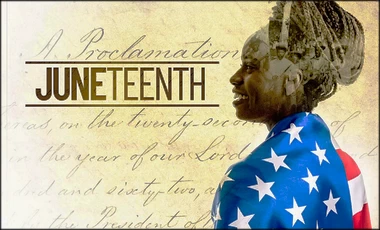(The “Black National Anthem” is related to this holiday… JUMP TO THAT.) The BABYLON BEE hits the nail on the head! They use sarcasm to show the way to the GOP’s proud history!
WASHINGTON, D.C. – The Senate has unanimously passed a resolution to recognize Juneteenth as a federal holiday, commemorating the glorious day Republicans freed the last of the Democrats’ slaves.
“We are so proud to show the world how not racist we are by officially recognizing the day the Republicans came charging in to free all our slaves,” said Senate Democrat Chuck Schumer. “Yeah– we Democrats did a little ‘whoopsie’ with that whole slavery thing, but the Republicans corrected it. Thanks, Republicans!”
During this year’s Juneteenth, the nation will gather to celebrate the American political party that was founded on protecting human rights of people of all skin colors. Democrats around the country will write letters of apology and organize celebrations for the vast network of Christians, Catholics, Quakers, and Republicans who fought and died to end the scourge of slavery in America.
Congress has also approved the building of a giant elephant statue in D.C. to honor the party responsible for the freeing of slaves from Democrat plantations.
Biden has confirmed he will organize a celebration at the White House after he lays a wreath on the grave of his best friend Robert Byrd.
FIRST, two 5-minute videos on the Republican’s proud history that led to JUNETEENTH
|
The Inconvenient Truth |
The Inconvenient Truth |
Last year, President Joe Biden made Juneteenth the newest federal holiday. The day is said to commemorate slaves in Texas hearing the news of Abraham Lincoln’s Emancipation Proclamation and of their impending freedom on June 19, 1865. Let’s set aside the fact the 13th Amendment wasn’t ratified until December 1865 and was not officially banned in President Biden’s home state of Delaware until 1901. June 19, 2020, was the first time that many Americans heard the word Juneteenth, but it wasn’t in connection with freed slaves from a century and a half ago, it was a part of the protests following the death of George Floyd. Jason believes the connection to Floyd is problematic. “I suspect most people don’t fully comprehend or get Juneteenth. It’s a national holiday because of the death of George Floyd, not because our political leaders had a sincere interest in celebrating the emancipation of slaves in Texas or across the South.” Jason has an alternative to the polarizing, over-politicized holiday. “Fearless” contributor Delano Squires shares his thoughts and discusses the problem with the colors red, green, and black being associated with Juneteenth. “Fearless” soldier Dave Shannon answers the question of whether America will ever accept the holiday as a legitimate one. Plus, Shemeka Michelle has some words for Joy Reid.
The following comes by way of AMERICAN DEFENSE NEWS:
ANALYSIS – While the Left wants to make the heretofore little-known date of June 19, 1965, a new holiday to bash America due to its partial history of slavery, Juneteenth (as it is now known) is not the date slavery ended in the United States.
Or the day the last slaves were freed.
[….]
Juneteenth is actually only a day to celebrate a great Republican president’s historic message freeing the slaves finally reaching the Confederate state of Texas.
That great Republican president was of course, Abraham Lincoln, and his historic message was the Emancipation Proclamation of January 1, 1863.
As the nation approached its third year of bloody civil war, Lincoln’s proclamation declared “that all persons held as slaves” within the rebellious states “are, and henceforward shall be free.”
So, January 1, 1963, could be a great day to celebrate. But despite Lincoln’s’ message, the reality or ending slavery took a while longer.
So, what exactly is Juneteenth about?
Well, this latest federal holiday, created last year when President Biden signed legislation that made Juneteenth a federal holiday in the wake of the Black Lives Matters’ (BLM) 2020 ‘summer of love’ and riots, marks the day residents of Galveston received General Orders No. 3, which freed slaves in Texas.
On June 19, 1865, about two months after the Confederate general Robert E. Lee surrendered at Appomattox, Va., Gordon Granger, a Union general, arrived in Galveston, Texas, the last remaining Confederate state, to inform enslaved black Americans of their freedom and that the Civil War had ended.
That is the day slavery officially ended in the Confederate South.
However, that wasn’t the end of slavery in America. That didn’t come until a full six months later on December 6, 1865.
And that is another great day to celebrate.
That is the date the last American slaves in two remaining Union states (Kentucky which was nominally part of the Union and Biden’s home state of Delaware) were officially freed when the 13th Amendment was ratified and officially proclaimed.
That’s the real date slavery fully ended in America.
So, while Juneteenth has some significance for Texas and the Confederacy, it’s neither the day announcing the end of slavery by a great Republican President on January 1, 1963, nor the date slavery was finally ended in the entire United States on December 6, 1865.
It is the date Lincoln’s freeing of the slaves finally reached Texas though. The last Confederate state standing.
JUNETEENTH is related to the …
BLACK NATIONAL ANTHEM:
BILL MAHER
New Rule: We need to unite as one nation, who come together and sing one anthem. It doesn’t have to be the one we currently use, but it has to be just one.
HODGE TWINS
NFL To Play “BLACK NATIONAL ANTHEM” Before National Anthem
MORE Proud History!
Hat-tip to GATEWAY PUNDIT:
Juneteenth is NOT “Black Independence Day.”
Once again, the Left has sold black people our own segregation…
WALK WITH ME. pic.twitter.com/ytJJyPSOPQ
— Xaviaer DuRousseau (@XAVIAERD) June 18, 2024
September 22, 1862: Republican President Abraham Lincoln issues preliminary Emancipation Proclamation
January 1, 1863: The Emancipation Proclamation, implementing the Republicans’ Confiscation Act of 1862, takes effect
The Democratic Party continues to Support Slavery.
February 9, 1864: Susan B. Anthony and Elizabeth Cady Stanton deliver over 100,000 signatures to U.S. Senate supporting Republicans’ plans for constitutional amendment to ban slavery
June 15, 1864: Republican Congress votes equal pay for African-American troops serving in U.S. Army during Civil War
June 28, 1864: Republican majority in Congress repeals Fugitive Slave Acts
October 29, 1864: African-American abolitionist Sojourner Truth says of President Lincoln: “I never was treated by anyone with more kindness and cordiality than were shown to me by that great and good man”
January 31, 1865: 13th Amendment banning slavery passed by U.S. House with unanimous Republican support, intense Democrat opposition
Republican Party Support: 100% Democratic Party Support: 23%
March 3, 1865: Republican Congress establishes Freedmen’s Bureau to provide health care, education, and technical assistance to emancipated slaves
April 8, 1865: 13th Amendment banning slavery passed by U.S. Senate
Republican support 100% Democrat support 37%
June 19, 1865: On “Juneteenth,” U.S. troops land in Galveston, TX to enforce ban on slavery that had been declared more than two years before by the Emancipation Proclamation
November 22, 1865: Republicans denounce Democrat legislature of Mississippi for enacting “black codes,” which institutionalized racial discrimination
1866: The Republican Party passes the Civil Rights Act of 1866 to protect the rights of newly freed slaves
December 6, 1865: Republican Party’s 13th Amendment, banning slavery, is ratified
*1865: The KKK launches as the “Terrorist Arm” of the Democratic Party
February 5, 1866: U.S. Rep. Thaddeus Stevens (R-PA) introduces legislation, successfully opposed by Democrat President Andrew Johnson, to implement “40 acres and a mule” relief by distributing land to former slaves
April 9, 1866: Republican Congress overrides Democrat President Johnson’s veto; Civil Rights Act of 1866, conferring rights of citizenship on African-Americans, becomes law
April 19, 1866: Thousands assemble in Washington, DC to celebrate Republican Party’s abolition of slavery
May 10, 1866: U.S. House passes Republicans’ 14th Amendment guaranteeing due process and equal protection of the laws to all citizens; 100% of Democrats vote no
June 8, 1866: U.S. Senate passes Republicans’ 14th Amendment guaranteeing due process and equal protection of the law to all citizens; 94% of Republicans vote yes and 100% of Democrats vote no
July 16, 1866: Republican Congress overrides Democrat President Andrew Johnson’s veto of Freedman’s Bureau Act, which protected former slaves from “black codes” denying their rights
July 28, 1866: Republican Congress authorizes formation of the Buffalo Soldiers, two regiments of African-American cavalrymen
July 30, 1866: Democrat-controlled City of New Orleans orders police to storm racially-integrated Republican meeting; raid kills 40 and wounds more than 150
January 8, 1867: Republicans override Democrat President Andrew Johnson’s veto of law granting voting rights to African-Americans in D.C.
July 19, 1867: Republican Congress overrides Democrat President Andrew Johnson’s veto of legislation protecting voting rights of African-Americans
March 30, 1868: Republicans begin impeachment trial of Democrat President Andrew Johnson, who declared: “This is a country for white men, and by God, as long as I am President, it shall be a government of white men”
May 20, 1868: Republican National Convention marks debut of African-American politicians on national stage; two – Pinckney Pinchback and James Harris – attend as delegates, and several serve as presidential electors
1868 (July 9): 14th Amendment passes and recognizes newly freed slaves as U.S. Citizens
Republican Party Support: 94% Democratic Party Support: 0%
September 3, 1868: 25 African-Americans in Georgia legislature, all Republicans, expelled by Democrat majority; later reinstated by Republican Congress
September 12, 1868: Civil rights activist Tunis Campbell and all other African-Americans in Georgia Senate, every one a Republican, expelled by Democrat majority; would later be reinstated by Republican Congress
September 28, 1868: Democrats in Opelousas, Louisiana murder nearly 300 African-Americans who tried to prevent an assault against a Republican newspaper editor
October 7, 1868: Republicans denounce Democratic Party’s national campaign theme: “This is a white man’s country: Let white men rule”
October 22, 1868: While campaigning for re-election, Republican U.S. Rep. James Hinds (R-AR) is assassinated by Democrat terrorists who organized as the Ku Klux Klan
November 3, 1868: Republican Ulysses Grant defeats Democrat Horatio Seymour in presidential election; Seymour had denounced Emancipation Proclamation
December 10, 1869: Republican Gov. John Campbell of Wyoming Territory signs FIRST-in-nation law granting women right to vote and to hold public office
February 3, 1870: The US House ratifies the 15th Amendment granting voting rights to all Americans regardless of race
Republican support: 97% Democrat support: 3%
February 25, 1870: Hiram Rhodes Revels becomes the first Black seated in the US Senate, becoming the First Black in Congress and the first Black Senator.
May 19, 1870: African American John Langston, law professor and future Republican Congressman from Virginia, delivers influential speech supporting President Ulysses Grant’s civil rights policies
May 31, 1870: President U.S. Grant signs Republicans’ Enforcement Act, providing stiff penalties for depriving any American’s civil rights
June 22, 1870: Republican Congress creates U.S. Department of Justice, to safeguard the civil rights of African-Americans against Democrats in the South
September 6, 1870: Women vote in Wyoming, in FIRST election after women’s suffrage signed into law by Republican Gov. John Campbell
December 12, 1870: Republican Joseph Hayne Rainey becomes the first Black duly elected by the people and the first Black in the US House of Representatives
In 1870 and 1871, along with Revels (R-Miss) and Rainey (R-SC), other Blacks were elected to Congress from Alabama, Florida, Georgia, Louisiana, Mississippi, North Carolina and Virginia – all Republicans.
A Black Democrat Senator didn’t show up on Capitol Hill until 1993. The first Black Congressman was not elected until 1935.
February 28, 1871: Republican Congress passes Enforcement Act providing federal protection for African-American voters
March 22, 1871: Spartansburg Republican newspaper denounces Ku Klux Klan campaign to eradicate the Republican Party in South Carolina
April 20, 1871: Republican Congress enacts the (anti) Ku Klux Klan Act, outlawing Democratic Party-affiliated terrorist groups which oppressed African-Americans
*** You get the picture. MORE AT FREE REPUBLIC
PART 1 – Revealing the Truth About The Democratic Party!!
PART 2 – Revealing the Truth about the Democratic Party Part 2: The Parties Switched


